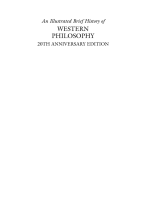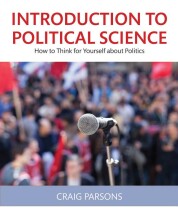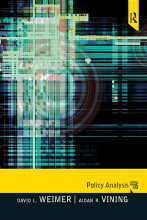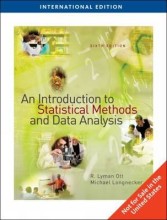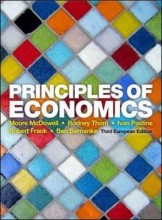Summary: An Illustrated Brief History Of Western Philosophy, 20Th Anniversary Edition | 9781119452799 | Anthony Kenny
- This + 400k other summaries
- A unique study and practice tool
- Never study anything twice again
- Get the grades you hope for
- 100% sure, 100% understanding
Read the summary and the most important questions on An Illustrated Brief History of Western Philosophy, 20th Anniversary Edition | 9781119452799 | Anthony Kenny
-
3 The Philosophy of Plato
-
3.1 Life and works
-
Plato's dialogue falls into three classes:
- 'Socratic' dialogues: in each of them Socrates appears in his historic role as the questioner and deflater or spurious claims to knowledge.
- In the central groups of dialogues, dating from Plato's maternity, Socrates is again the principle figure; but he is no longer simply an attorney prosecuting prejudices that masquerade as knowledge. He know appears as a teacher, expounding elaborate philosophical ideas. Longer and more difficult dialogues.
- Final group: the role of Socrates diminishes.
-
3.3 Plato's Republic
This is a preview. There are 2 more flashcards available for chapter 3.3
Show more cards here -
Justice is the health of the soul is the unifying theme of The Republic. Plato's notion of justice as physic health makes its final appearance in a new proof of immortality which concludes the Republic. Each thing us destroyed by its characteristic disease, but vice does not destroy the soul in the way disease destroys the body. But if the soul is not killed by its own disease, it will be hardly killed by diseases of anything else, and so it must be immortal. By defining justice as the health of the soul Plato achieved three things:
- He provided himself with an easy answer to the equation 'why be just?' -> everyone want to be healthy
- If injustice is a disease, it should be possible to eradicate it by the application of medical science.
- If every vicious man is really a sick man, then the virtuous philosopher can claim over him the type of control which a doctor has ever his patients.
- He provided himself with an easy answer to the equation 'why be just?' -> everyone want to be healthy
-
4 Probability and probability distributions
-
4.1 Introduction and abstract of research study
-
Three definitions of probability are:
- Classical interpretation of probability: the probability of an event E is computed by taking the ratio of the number of outcomes favorable to event E tot the total number of possible outcomes.
- Relative frequency concept of probability: empirical approach, if an experiment is conduced n different times and if event E occurs on ne of these trials, then the probability of event E is approximately ne/n
- Personal or subjective probability: making a one-shot statement pf belief regarding the likelihood of passage of the event.
- Classical interpretation of probability: the probability of an event E is computed by taking the ratio of the number of outcomes favorable to event E tot the total number of possible outcomes.
-
4.3 Basic event relations and probability laws
This is a preview. There are 3 more flashcards available for chapter 4.3
Show more cards here -
Two events A and B are said to be mutually exclusive if (when the experiment is performed a single time):
The occurrence of one of the events excludes the possibility of the occurrence of the other event. -
7 Early medieval philosophy
-
7.1 John the Scot
This is a preview. There are 1 more flashcards available for chapter 7.1
Show more cards here -
The most significant Western philosopher of the ninth century was John the Scot (Eriugena). Despite the influence of Greek sources, Eriugena's ideas are often original and imaginative; but his teaching was difficult to reconcile with Christian orthodoxy. His language about God is highly agnostic, as he said:
God cannot be described in human language. God therefore is beyond all being and so it is more correct to say that He does not exist than than He exists. Eriugena tries to safe himself form sheer atheism by saying that what God is doing is something better than existing. -
8 Philosophy in the thirteenth century
-
8.5 Aquinas' natural theology
This is a preview. There are 1 more flashcards available for chapter 8.5
Show more cards here -
Aquinas' most famous contribution to the philosophy of religion is the five ways or proofs of the existence of God:
- Motion is the world is only explicable if there is a first unmoved mover
- The series of efficient causes in the world must lead to an uncaused cause
- Contingent and corruptible beings must depend on an independent and incorruptible necessary being
- The varying degrees of reality and goodness in the world must be approximations to a subsistent maximum of reality and goodness
- The regular teleology of non-conscious agents int he universe entails the existence of an intelligent universal Order.
- Motion is the world is only explicable if there is a first unmoved mover
-
8.6 Matter, form, substance and accident
-
Matter and form are the concepts used by Aristotelians to analyze substantial change, the type of change when one kind of thing turns into another. To analyze the less drastic change when one and the same thing gains or loses a transient property (grows taller/becomes sunburnt), the concepts used were substance and accident. The doctrine of transubstantiation says:
In an ordinary change, where the form of A-ishness gives way to the form of B-ishness, we have transformation. But, when we have not just one form giving way to another, but one substance giving way to another, we have transubstantiation -> a turning of one thing into another which has no parallel. -
8.9 Aquinas' moral philosophy
-
Accoridng to Aquinas, there are three types of action:
- Those things which we do for their own sake, wanted as ends in themselves (practicing philosophy)
- Those things we do because they are means to ends which we want for themselves. It is in these actions that we exhibit intention: we intend to achieve the end by the means
- There are the consequences and side effects which our intentional actions bring about, not intentional, but merely voluntary. Voluntariness, then, is the broadest category; whatever is intentional is voluntary, but not vice versa.
- Those things which we do for their own sake, wanted as ends in themselves (practicing philosophy)
-
According to the doctrine of double effect, if an act, not evil in itself, has both good and bad effects, then it may be permissible if:
- The evil is not intended
- The good effect is not produced by means of the bad
- On balance, the good done outweighs the harm
- The evil is not intended
-
11 The Age of Descartes
-
11.1 The life of Descartes
This is a preview. There are 1 more flashcards available for chapter 11.1
Show more cards here -
Descartes two main ideas can be concisely expressed as:
- Man is a thinking mind
- Matter is an extension in motion
- Man is a thinking mind
- Higher grades + faster learning
- Never study anything twice
- 100% sure, 100% understanding
